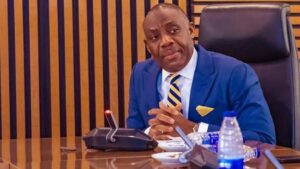
Alausa
By Bose
Kindly share:
In a major policy reversal, the Federal Government has scrapped the use of indigenous languages as the medium of instruction in Nigerian schools, reinstating English as the primary language of teaching and learning from pre-primary to tertiary levels.
The announcement was made on Wednesday by the Minister of Education, Dr. Tunji Alausa, at the 2025 Language in Education International Conference, organised by the British Council in Abuja.
According to Alausa, the reversal was approved at the 69th meeting of the National Council on Education (NCE) held in Akure, Ondo State, between November 3 and 7.
The now-cancelled National Language Policy, introduced in 2022, had required that children from Early Childhood Education to Primary Six be taught in their mother tongue or the language of their immediate community. The initiative was intended to strengthen indigenous languages, foster national identity, and improve comprehension at the foundational level.
However, the Education Minister said the policy had failed to achieve its goals, citing empirical data showing widespread underperformance in regions where the mother-tongue approach was extensively applied.
“We have seen a mass failure rate in WAEC, NECO, and JAMB in certain geo-political zones of the country, and those are the ones that adopted the mother tongue in an oversubscribed manner,” Alausa said.
“This is about evidence-based governance. English now stands as the medium of instruction from pre-primary to tertiary education.”
He further stressed that over 15 years, the use of indigenous languages in classrooms “has literally destroyed education in certain regions,” and policy decisions must be guided by facts rather than emotions.
A national performance review, the minister explained, revealed that pupils taught mainly in local languages recorded higher failure rates in national examinations and demonstrated weaker English proficiency, a key skill for academic and professional advancement.
“The national policy on language has been cancelled. English now stands as the medium of instruction across all levels of education in Nigeria,” he declared.
Alausa invited scholars and stakeholders with contrary evidence to present verifiable data, assuring that the government remains open to dialogue based on research and measurable outcomes.
The reversal of the 2022 language policy marks a significant turning point in Nigeria’s education system. While language experts and cultural advocates have long argued that children learn best in their native languages, policymakers say national learning outcomes and global competitiveness must now take precedence.
“This decision is not political; it’s practical. It is about aligning Nigeria’s education policy with what works, and the evidence shows that English does,” Alausa explained. Vanguard





